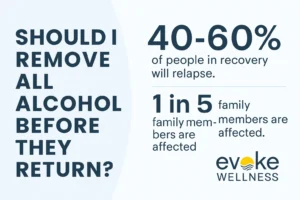They finally went to alcohol detox.
Maybe it took a fight, an intervention, or a quiet decision after weeks of spiraling.
Maybe it felt like hope. Maybe it felt like a sigh of relief. Maybe it didn’t feel like anything yet.
Now they’re coming home. And you’re staring at a shelf full of wine bottles—or a cabinet full of beer—wondering:
“Should I clear it out before they walk in the door?”
“Will that help—or hurt?”
“Is that love…or control?”
If you’re asking yourself those questions, it’s not because you’re overreacting. It’s because you care—and you’re tired. This blog is for you.
Find out how alcohol detox works at our Hilliard, Ohio center.
First: There’s No One-Size-Fits-All Answer
We wish there were. But like most things in recovery and relationships, the answer to “should I remove the alcohol from the house?” is layered.
It depends on:
- Whether they want to be sober
- Whether they’ve asked for help with triggers
- Whether you feel emotionally safe with alcohol in the home
- Whether it’s a shared space, or your space
- And, importantly: whether this is the first detox—or the fifth
This is less about right vs. wrong, and more about: “What does support look like for us, right now?”
That’s a question worth sitting with. And you don’t have to sit with it alone.
Ask Yourself: Is This About Safety or Control?
If you’re considering clearing the house of alcohol, check in with your why.
- Is it because you don’t want them tempted?
- Because you’re scared of seeing them drink again?
- Because you feel angry and want to reclaim control?
All of those are valid feelings. But the action will feel different depending on the emotion underneath.
If it’s about supporting their recovery, ask if they’d like the help.
If it’s about your own emotional safety, you’re allowed to name that too.
Example:
“I love you, and I’m proud of you. But I’m not okay living in a house with alcohol right now.”
That’s not control. That’s clarity.
What If They Didn’t Ask Me To Do Anything?
That’s common. Many people don’t want to talk about triggers after detox. Some don’t know how. Others want to be “strong enough” to come home to the same environment and prove they can handle it.
If they haven’t asked for anything, consider a middle-ground option:
- Remove obvious bottles but store them discreetly
- Ask if they’d like the alcohol moved, rather than dumped
- Have a conversation that starts with curiosity, not assumptions
Something like:
“I wasn’t sure what would feel most supportive to you. I want to make our home feel safe for both of us—do you want to talk about that?”
Even if the answer is “I don’t know,” you’ve opened the door.
What If They’re Still Not Sure They Want Sobriety?
This one cuts deep.
If they went to detox but haven’t committed to recovery, your boundaries matter even more.
It is not controlling to protect your own nervous system from the presence of alcohol in the home.
You might say:
“Even if you’re not ready to stop, I can’t have alcohol here. I hope you understand that’s about what I need—not a rule for you.”
This is painful. You may feel like you’re drawing lines in shifting sand. That’s normal. But naming your truth clearly—without threat or ultimatum—is one of the most loving things you can do for both of you.
What If They Relapse Anyway?
You might do everything right—clear the house, make things comfortable, offer support—and they might still drink.
That isn’t your fault.
You didn’t cause their addiction, and you can’t cure it.
Relapse is part of many people’s recovery story. What matters is that you have a plan for what to do next—emotionally and practically—if it happens.
At Evoke Wellness Ohio, we don’t just support clients in detox. We help families think through what comes next too.
Reach out here to learn how our alcohol detox program works.
Should I remove all alcohol before they return?
If they’ve asked for support around triggers, yes. If they haven’t, consider a shared conversation. You’re not required to live with alcohol to “prove” trust.
Is it controlling to change the home environment without asking?
It depends on your intent. If you’re doing it out of fear or anger, it can feel controlling. But if it’s about safety and mutual care, it can be loving and appropriate.
What if they feel disrespected by my decision?
That’s possible. But your needs matter too. If you’ve removed alcohol out of concern or self-preservation, share that honestly. Their discomfort doesn’t mean you were wrong.
Can I ask them to not bring alcohol into the house?
Yes. That’s a boundary, not control. You’re not dictating their choices—you’re expressing what you need to feel safe in your own home.
What support is available for me as a partner?
Consider Al-Anon, therapy, or support from the detox facility itself. Many treatment centers, including Evoke, offer family services or can help you connect to local resources.
You’re Allowed to Want Peace, Too
It’s easy to make their recovery the focus.
It’s harder to ask: What do I need to recover from?
Because being in love with someone who uses is exhausting.
And loving them through detox doesn’t mean erasing your own limits.
Whether you choose to clear the house or not—please know this:
You’re allowed to want peace.
You’re allowed to need help, too.
You’re allowed to not know what the “right” thing is yet.
And you’re not a bad partner if you’re tired.
Trying to support someone in early recovery while still supporting yourself?
Call (866)430-9267 or visit Evoke Wellness Ohio’s Alcohol Detox Center to talk with someone who understands what both of you are navigating.



